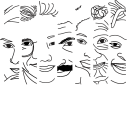What is hepatitis C?
The word hepatitis means inflammation of the liver. Too much alcohol, some drugs and chemicals and some viruses can cause hepatitis. The main viruses that cause hepatitis are the hepatitis A virus, the hepatitis B virus or the hepatitis C virus. These viruses are all different – the only thing they have in common is that they affect the liver.
The hepatitis C virus and the hepatitis B virus can cause chronic hepatitis, that is, inflammation of the liver that lasts more than 6 months. There is a vaccination to prevent hepatitis A virus and the hepatitis B virus. There is no vaccination for the hepatitis C virus. This information is mostly about the hepatitis C virus which causes hepatitis C.
How does hepatitis C affect the liver?
The liver is very important to a person’s wellbeing because it has many functions that keep you healthy.
The liver:
- Clears the blood of waste products, hormones, drugs and other toxins
- Makes, stores and releases sugars, fats, and proteins
- Helps with digesting food
- Stores vitamins, minerals and iron.
The hepatitis C virus can cause chronic infection and liver damage over a long period of time. Over time, more liver cells are damaged and destroyed, causing the liver to scar. This is called fibrosis. Severe fibrosis can cause the liver to become hardened, and prevents it from working well. This is called cirrhosis of the liver. In a small number of cases, serious damage to the liver can lead to liver failure and liver cancer.
Hepatitis C infection affects people differently. Some people are not affected by it while others can be affected seriously. Research has shown that about 25% of people infected with hepatitis C will clear the virus within 12 months. Over many years, hepatitis C can lead to liver damage, but for most people hepatitis C does not result in serious liver disease.
Hepatitis C Infection
| Of 100 people with hepatitis C | 25 will clear the virus naturally within the first 12 months | |
| 75 will continue to have the virus in their body, but may experience no obvious symptoms | ||
| Without medical treatment, 30 will develop symptoms, which will become noticeable between 10 to 15 years | ||
| 20 years after infection, 10 will have developed serious liver disease | ||
| 5 of these will develop liver failure or liver cancer and may die |
How do you get the hepatitis C virus?
The hepatitis C virus is transmitted when infected blood enters the bloodstream. The majority of people with hepatitis C in Australia have been infected through sharing equipment used to inject drugs e.g. heroin, speed or steroids. Many people born overseas have been infected through unsterile medical, dental and cosmetic procedures and vaccinations in the past. Even today, hepatitis C can be transmitted in this way in some countries.
The hepatitis C virus can also be spread by:
| Sharing and reusing any equipment used for injecting drugs | high risk |
| Unsterile medical, dental and cosmetic procedures, and vaccinations, overseas | high risk |
| Unsterile tattooing and body piercing | high risk |
| Accidental needle-stick injury | moderate/low risk |
| Mother to baby, before or during birth | moderate/low risk |
| Sharing of razor-blades and toothbrushes | low risk |
| Blood transfusion in Australia before 1990 | low risk |
| Blood transfusion in Australia after Feb 1990 | very low risk |
| Sexual activity (without blood-to-blood contact) | very low risk |
| Breastfeeding | very low risk |
Hepatitis C cannot be spread through social contact. Mosquitoes or other insects, hugging, kissing, sneezing, coughing, sharing food, drinks, plates, eating utensils, laundry and toilet facilities will not transmit hepatitis C.
What is a genotype?
The genotype is the type of hepatitis C virus you have. There are at least six different genotypes of the hepatitis C virus. Knowing what genotype you have is important as this determines the medication you need as well as the length of time you need to be on treatment. The genotype does not refer to the severity of liver disease.
What are the symptoms of hepatitis C?
Some people with hepatitis C do not experience any symptoms for many years. For those who do, symptoms are a bit like the flu. Some people may have nausea, extreme tiredness and pain or discomfort around the liver. The only way to know if you have hepatitis C is to ask for a blood test which is available from your doctor.
I have hepatitis C: What can I do to prevent passing it on to other people?
In the home:
- Do not share razors, toothbrushes or nail clippers
- Clean up any blood spills carefully using latex gloves, soap, warm water and bleach
- Put any blood stained things such as bandaids, dressings, tampons and sanitary napkins in a plastic bag before putting them in the bin.
If you inject drugs:
If you inject drugs always use your own new needles, syringes and other injecting equipment. Sharing drug injecting equipment can lead to the transmission of the hepatitis C virus and the hepatitis B virus and HIV, the virus that causes AIDS. Always take care to dispose of your injecting equipment carefully so that no other person can use it.
When you travel overseas:
It is important to be ‘blood aware’ all the time, especially when you are in another country and minimise any practices that involve blood-to-blood contact such as injecting, dental work and any form of tattooing.
Can I have sex?
Sexual contact is very low risk for hepatitis C transmission. However, care is needed where blood is present during sex such as during menstruation. Where there is blood, it is recommended that you use condoms during sex. Condoms also protect you from sexually transmitted diseases such as HIV and hepatitis B.
Remember, people with hepatitis C can live healthy and fulfilling lives and are not at risk to their family, the people they live with, or the people they work with.
Co-infection with other viruses
Co-infection means infection with more than one virus. People with hepatitis C can be co-infected with HIV and/or hepatitis B, mainly because they are transmitted in similar ways – through blood-to-blood contact. Co-infection can speed up the progression of hepatitis C and increase the risk of developing liver disease or cancer.
What are the effects of alcohol and drugs?
There is a higher risk of getting liver disease, including cirrhosis, if you have hepatitis C and drink alcohol. Alcohol may also affect how you respond to hepatitis C treatment, making it less effective.
If you have hepatitis C, but not cirrhosis, it is recommended that you drink less alcohol, no more than 7 standard drinks per week. If you have cirrhosis, it is recommended that you do not drink any alcohol.
Smoking tobacco or illicit drugs like marijuana can also increase the progression of liver disease and the risk of heart disease.
Staying healthy and looking after yourself
If you have hepatitis C, there are ways you can stay healthy and lower the risk of more serious liver disease.
- Maintain a healthy diet that is low in fat, sugar and salt
- Drink less or no alcohol
- Get plenty of rest
- Do regular exercise, as far as comfortable
- Try to avoid or manage stress
- Drink plenty of water
- Avoid taking medicines that may cause more harm to your liver
- Talk to your doctor if you decide to take vitamins or complementary (eg. herbal) medicines.










